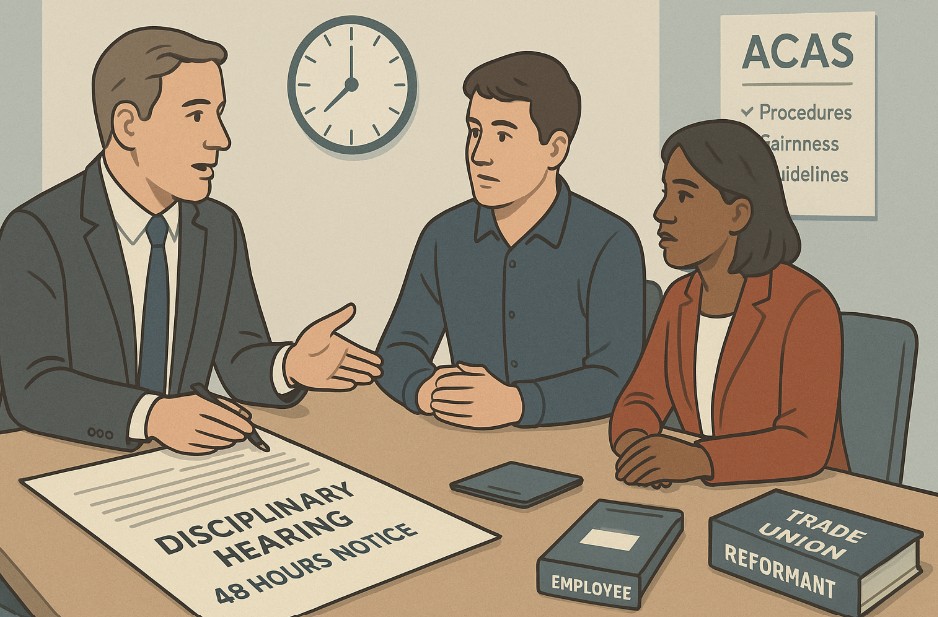48 Hours Notice Disciplinary Hearing ACAS Rule: What Every UK Employer Should Know?
In the UK, disciplinary procedures in the workplace are subject to well-defined standards, especially when it comes to notice periods and fair treatment.
One of the most commonly asked questions by employers and employees alike is whether 48 hours’ notice before a disciplinary hearing is legally acceptable, and how it aligns with the ACAS Code of Practice.
This blog explores in depth what the 48 hours notice disciplinary hearing ACAS rule means, how it should be handled, and the consequences of failing to follow fair procedure.
It also offers practical guidance for both employers and employees on rights, responsibilities, preparation, and outcomes of disciplinary hearings.
What Does the ACAS Code of Practice Say About Disciplinary Hearings?
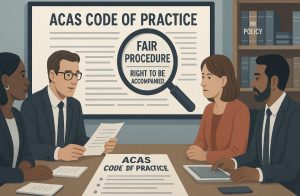
ACAS, or the Advisory, Conciliation and Arbitration Service, plays a central role in shaping workplace disciplinary practices in the UK.
The ACAS Code of Practice on Disciplinary and Grievance Procedures outlines the basic standards employers are expected to follow.
While it is not legally binding in itself, employment tribunals closely consider whether the ACAS Code was followed when reviewing unfair dismissal cases.
A fundamental principle in the ACAS Code is the importance of treating employees fairly throughout the disciplinary process.
This includes ensuring they understand the allegations, receive adequate time to prepare, and have the opportunity to present their case.
Although the ACAS Code does not prescribe a specific notice period, it requires that employees be given “reasonable notice” to attend a disciplinary hearing, allowing them time to prepare and arrange representation if needed.
Is It a Legal Requirement to Give 48 Hours’ Notice for a Disciplinary Hearing?
There is no specific statutory obligation in the UK that mandates a 48-hour notice period for a disciplinary hearing.
However, ACAS guidelines and tribunal precedents have established that 48 hours is generally considered a reasonable timeframe, especially in straightforward cases.
A 48-hour notice period is intended to provide the employee with sufficient opportunity to review any evidence, understand the allegations being made, and consult with a colleague or trade union representative.
However, whether 48 hours constitutes sufficient notice depends on several factors, such as the complexity of the case, the number of allegations, and the amount of documentation involved.
In more complex cases, it may be necessary to allow additional time.
If an employee feels they have not been given adequate time to prepare, they can request an extension. While employers are not legally bound to approve such requests, they are expected to consider them fairly and explain their decision.
What Does a 48-Hour Notice for a Disciplinary Hearing Mean?
Receiving a 48-hour notice for a disciplinary hearing means that the employee is being formally asked to attend a meeting to discuss allegations of misconduct or performance issues.
This hearing is part of a structured disciplinary procedure where the employee is given the opportunity to respond to the accusations before any decisions are made.
The notice should include the nature of the allegations, the date and time of the hearing, the location, who will be present, and confirmation of the employee’s right to be accompanied.
The ACAS Code stipulates that the employee must be given sufficient time to prepare, though it does not mandate an exact timeframe.
Employers who provide a minimum of 48 hours’ notice, along with supporting documentation, are generally acting in accordance with good practice.
What Are the Steps of a Fair Disciplinary Procedure According to ACAS?
A disciplinary procedure is a formal process used by employers to manage issues related to misconduct or poor performance (capability). ACAS recommends a structured approach to ensure fairness throughout the process.
Step 1: Identifying the Issue

Employers must determine whether the problem relates to:
- Misconduct, such as inappropriate behaviour, harassment, or insubordination
- Capability, such as underperformance or inability to meet the job’s requirements
Where possible, the issue should be addressed informally first. Managers may speak privately with the employee, listen to their explanation, and offer support or training.
If informal resolution is not suitable or has failed, the formal disciplinary process should begin.
Step 2: Following a Fair Procedure
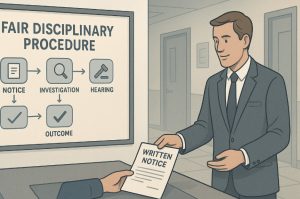
If disciplinary action is necessary, the employer must:
- Inform the employee of the concerns
- Send written confirmation outlining the allegations
- Provide supporting evidence
- Explain the potential consequences
- Allow the employee to be accompanied
It’s vital that the employer follows both the ACAS Code and their internal disciplinary policy.
Communication must remain open, and employers should take into account employee wellbeing, particularly in situations where stress or mental health issues are involved.
Step 3: Carrying Out an Investigation

Before any disciplinary hearing, an investigation must take place. This involves gathering as much information as possible to establish the facts. It may include reviewing documents, interviewing witnesses, or checking past records.
The investigation should be impartial and thorough. Employers must treat similar cases consistently and ensure that all relevant information is reviewed before moving to the next stage.
Step 4: Holding the Disciplinary Hearing
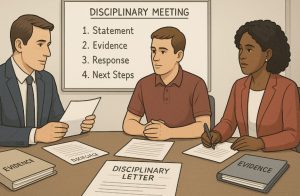
If the investigation concludes that there is a case to answer, the employee must be invited to a disciplinary hearing.
The invitation should include:
- Date, time, and venue
- The allegations in detail
- A summary of evidence
- The right to be accompanied
- The possible outcomes
The employee can choose a companion from:
- A colleague
- A certified trade union representative
- An official employed by a trade union
In some cases, additional accommodations should be made for disabled employees. Employers must allow the companion sufficient time to prepare.
At the hearing, the employer should outline the allegations, review evidence, and give the employee a fair chance to respond, present their own evidence, and ask questions. The hearing must be documented accurately.
If the employee is too ill to attend, the employer should consider rescheduling or offering alternative arrangements, such as holding the meeting in a different setting or remotely.
If the hearing must go ahead without the employee, they should be invited to submit a written statement.
Step 5: Deciding the Outcome
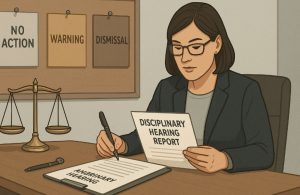
After the hearing, the employer must review all evidence objectively before making a decision. The outcome should be fair, reasonable, and consistent with previous cases.
Possible outcomes include:
- No action
- Informal or verbal warning
- First written warning
- Final written warning
- Demotion or reassignment
- Dismissal (in cases of gross misconduct)
Written warnings must clearly state the misconduct or performance issue, expected improvements, timescales, and the consequences of further issues.
Dismissals must follow due process and be communicated formally in writing, along with the right to appeal.
Step 6: After the Disciplinary

Post-hearing, the employer should:
- Talk to the employee and confirm the outcome
- Maintain confidentiality
- Update any necessary policies or provide training
- Keep a secure record of the case
Even if no action is taken, the process should be documented for future reference. If the employee resigns during the process, the employer should try to address their concerns, as this could lead to a constructive dismissal claim.
When providing references in the future, employers must ensure they are fair, accurate, and consistent with any outcomes recorded.
What Happens in a Disciplinary Hearing?
A disciplinary hearing is a formal meeting where the employer presents the evidence gathered during the investigation and gives the employee an opportunity to respond.
The employer outlines the allegations and the supporting evidence. The employee is then allowed to explain their side, challenge the evidence, ask questions, and present documentation or witnesses.
The companion may take notes and offer support. While they are not required to speak, they may do so to represent the employee’s case if permitted.
The hearing must be conducted fairly and without bias. The employer should not make a decision during the meeting but instead take time afterward to review all information objectively before reaching a conclusion.
What Are Possible Outcomes of a Disciplinary Hearing?

Once the hearing concludes, the employer must decide on the appropriate outcome based on the evidence presented and whether company policies were followed.
Outcomes may include:
- No further action if the case is unsubstantiated
- An informal or verbal warning for minor issues
- A written warning which may remain on record for a set period
- A final written warning in cases of serious misconduct or repeated issues
- Suspension or demotion
- Dismissal in cases of gross misconduct
The employer must communicate the decision in writing, explaining the reasons and outlining the process for appeal.
Can an Employee Appeal a Disciplinary Decision?
Employees have the right to appeal a disciplinary decision if they believe the outcome was unfair or that the process was flawed.
Grounds for appeal may include procedural errors, the emergence of new evidence, or perceived bias in the hearing. The appeal should be submitted in writing within the timeframe set by the employer’s disciplinary policy.
The appeal should ideally be heard by someone not involved in the original decision. If the appeal is unsuccessful, the employee may contact ACAS to begin Early Conciliation, or take the case to an employment tribunal if necessary.
How Can ACAS Help with Disciplinary Disputes?
ACAS provides a range of support services to help resolve disciplinary disputes in the workplace. These include guidance materials, training sessions, and free services such as Early Conciliation, which aims to resolve conflicts before they escalate to tribunals.
Employees and employers alike are encouraged to familiarise themselves with the ACAS Code of Practice. Although the Code is not law, tribunals take it into account when deciding if a dismissal was fair.
What Constitutes Misconduct and Gross Misconduct?
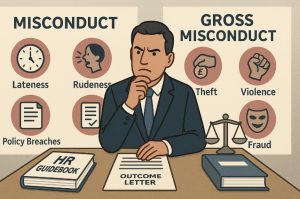
Misconduct generally refers to unacceptable behaviour, such as insubordination, absenteeism, or failure to follow company policies. Gross misconduct, on the other hand, includes more serious actions such as fraud, physical violence, or gross negligence.
Even in cases of gross misconduct, the employer must conduct a full and fair disciplinary procedure, including an investigation, a formal hearing, and the opportunity for the employee to respond.
What Happens After the Disciplinary Hearing?
Following the hearing, the employer must evaluate the case and issue a formal decision. This decision should be communicated promptly and in writing. The outcome must be based on the facts presented and in line with company procedures and past precedents.
If no further action is required, the employer should make this clear and support the employee in returning to work. If disciplinary action is taken, the employer must outline any expectations, timelines for improvement, and consequences of future breaches.
How Can Employees Avoid Future Disciplinary Issues?
Preventing future disciplinary problems involves understanding company policies, maintaining open communication, and keeping clear records.
Employees should take responsibility for their performance and behaviour, and raise concerns early to avoid misunderstandings.
Regular reviews and informal feedback sessions can also help address potential issues before they escalate into formal action.
Frequently Asked Questions
Can I be dismissed with only 48 hours’ notice of a hearing?
You can only be dismissed if a fair disciplinary process is followed. Even in gross misconduct cases, the employer must conduct an investigation and hearing.
Is my employer allowed to deny my request for more preparation time?
Employers can deny the request but must consider it fairly and provide justification if the hearing proceeds as scheduled.
Can I bring legal representation to the hearing?
Typically, you may only bring a colleague or trade union representative. Legal representation is rarely allowed unless the employer agrees.
What if I’m too ill to attend the hearing?
The employer may reschedule or offer alternatives such as virtual meetings. If long-term illness prevents attendance, the employer may proceed based on available evidence.
Does a disciplinary hearing always result in punishment?
Not necessarily. If the allegations are unfounded or the explanation is satisfactory, no action may be taken.
Can I raise a grievance during the disciplinary process?
Yes. If you believe the process is unfair, raising a grievance may pause the disciplinary proceedings until the complaint is resolved.
Will a disciplinary outcome appear on my reference?
Employers are not legally obliged to mention disciplinary outcomes, but if they provide a reference, it must be accurate and consistent.

